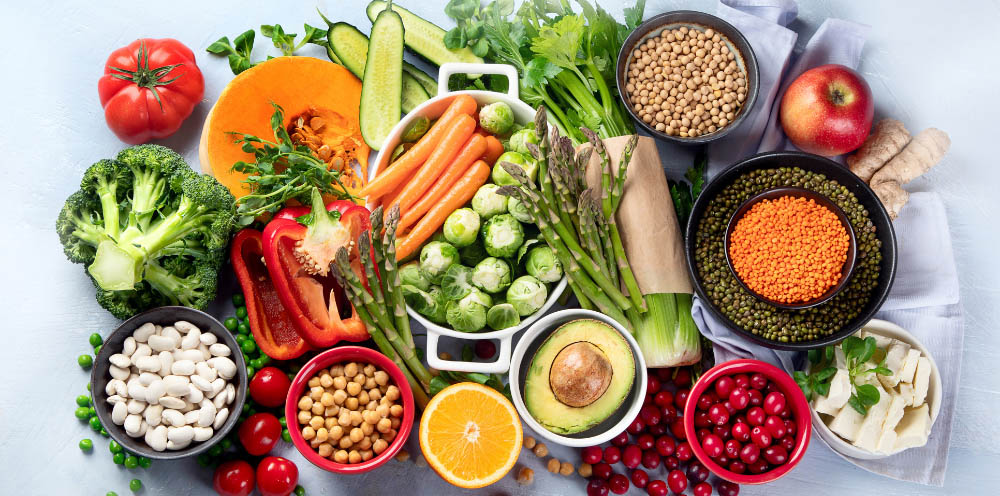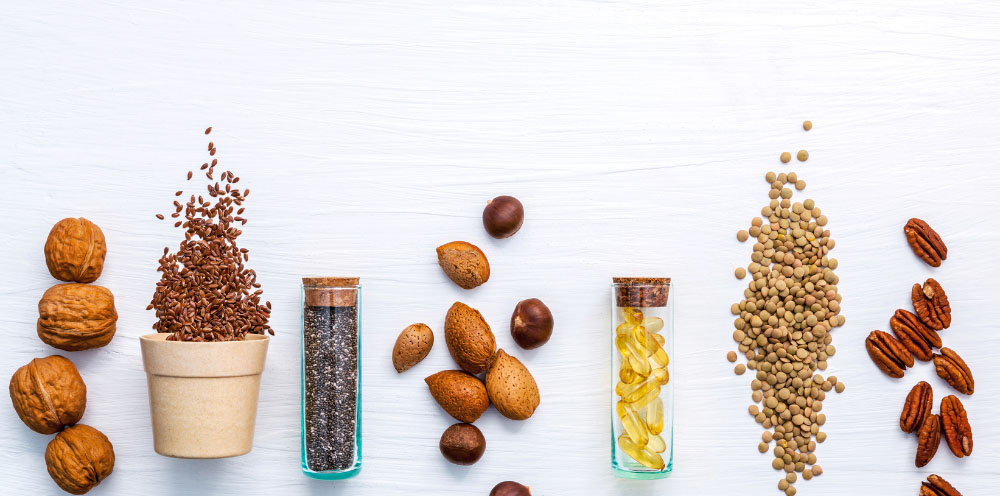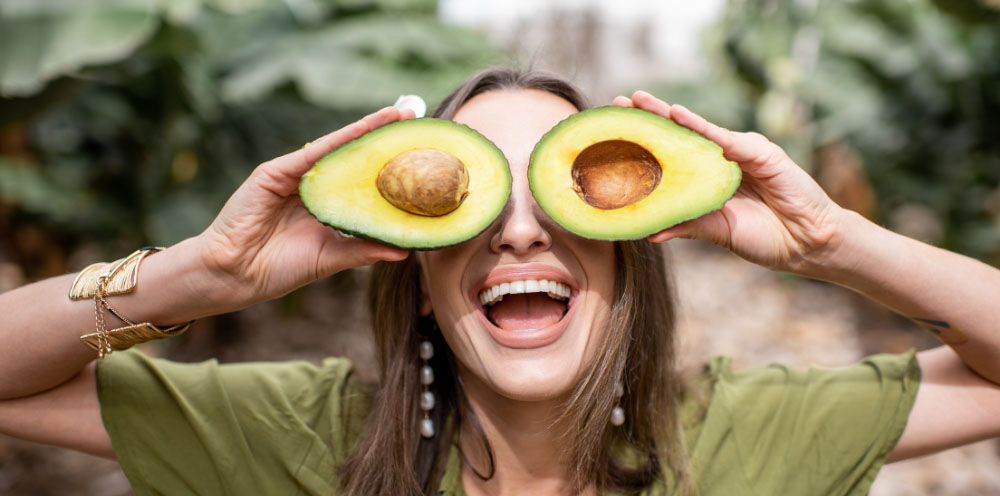A vegan diet is based on the exclusion of all animal products, which for many people is a healthy and ethical choice. However, giving up meat, dairy or eggs runs the risk of deficiencies in certain key nutrients that are difficult to find in a plant-based diet. To ensure full health and energy, vegans should pay attention to the supplementation of certain vitamins and minerals. In this article, we will introduce the most important supplements for vegans, discuss their role in the body and give tips on how to use them correctly.
Why are supplements important to vegans?

A vegan diet is rich in fibre, vitamins and minerals, but some key nutrients are mainly found in animal products. A lack of these can lead to deficiencies, which in turn affect the functioning of the body, weakening immunity, physical condition, ability to concentrate and overall energy levels.
Does a plant-based diet provide everything we need?

While there are many benefits to a plant-based diet, there are a few ingredients that are difficult to obtain solely from plants. Among the most common deficiencies in a vegan diet are vitamin B12, omega-3 fatty acids, vitamin D, iron, calcium, iodine and zinc. Therefore, adequate supplementation is crucial for those who want to avoid deficiencies and maintain optimal health.
Research on vegan dietary supplementation shows that many vegans experience deficiencies in some key nutrients. According to a study published in the Journal of the Academy of Nutrition and Dietetics, up to 52% of vegans were deficient in vitamin B12, which is difficult to obtain from a plant-based diet. Another study by the European Journal of Clinical Nutrition found that 74% of vegans had vitamin D levels below recommended standards, especially during the winter months.
Supplementation statistics also show that around 70-80% of vegans regularly supplement vitamin B12, while only 40% supplement omega-3 fatty acids, leading to potential deficiencies of these key components. These findings highlight the importance of proper supplementation for those on a plant-based diet to prevent health problems resulting from deficiencies.
The most important supplements for vegans

1. Vitamin B12
Why is vitamin B12 crucial?
Vitamin B12 is essential for the production of red blood cells, DNA synthesis and the proper functioning of the nervous system. Unfortunately, vitamin B12 is found almost exclusively in animal products, which means that vegans need to supplement.
Effects of vitamin B12 deficiency
Vitamin B12 deficiency can lead to serious health problems such as megaloblastic anaemia, damage to the nervous system, imbalance, muscle weakness and even depression. These symptoms can appear even after several years of deficiency, so regular supplementation is essential.
How to supplement vitamin B12?
Vegans should take vitamin B12 supplements in the form of methylcobalamin or cyanocobalamin, at a dose of around 25-100 mcg per day, depending on individual needs. Alternatively, higher doses of 1000-2000 mcg twice a week can be taken, avoiding the daily supplement.
2. Omega-3 fatty acids
The role of omega-3 fatty acids in the body
We have already written about the important role of omega-3 fatty acids on cellular ageing in this article. These acids are extremely important for heart health, brain health and the immune system. These acids, especially DHA and EPA, are difficult to obtain in a plant-based diet, as they are mainly found in fish and seafood.
Plant sources of omega-3
Plants such as flaxseed, chia seeds or walnuts contain ALA acid, which the body can convert into EPA and DHA, but this process is very inefficient. Therefore, vegans should consider supplementing omega-3 fatty acids from microalgae, which are a source of EPA and DHA.
How to supplement omega-3 fatty acids?
Supplements of omega-3 fatty acids for vegans are made from microalgae and are available in capsule form. It is recommended to take around 250-500 mg of DHA and EPA per day to meet the body’s needs.
3. Vitamin D
Why is vitamin D important?
Vitamin D plays a key role in bone health, calcium and phosphorus regulation and immune system function. Vitamin D deficiency can lead to weakened bones, osteoporosis, and increased susceptibility to infection.
Sources of vitamin D for vegans
The main source of vitamin D is dermal synthesis when exposed to sunlight, but in countries with little sunshine, especially in winter, vegans may struggle to get enough of this nutrient. In a plant-based diet, vitamin D is found in limited amounts, mainly in mushrooms.
How to supplement vitamin D?
Vegans should take vitamin D in the form of supplements, especially during autumn and winter. A dose of 1,000-2,000 IU per day is recommended, although some experts suggest even higher doses, especially in cases of known deficiencies. For vegans, the best option is vitamin D2 or a plant-based form of vitamin D3 extracted from lichens. Such a vegan form of vitamin D, extracted from seaweed, can be found in Endotelio Complex Vegan.
4. Iron
The role of iron in the body
Iron is crucial for the production of haemoglobin, the protein that transports oxygen in the blood. Iron deficiency can lead to anaemia, weakness, fatigue and concentration problems.
Plant sources of iron
Although iron is found in plants, its form (non-haem iron) is more difficult for the body to assimilate than the haem iron found in meat. Plant sources of iron include spinach, lentils, tofu, chickpeas and pumpkin seeds. Vegans should also consume foods rich in vitamin C, which increases iron absorption.
How to supplement iron?
If your diet does not provide enough iron, it is worth considering supplementation. Recommended doses of iron vary according to individual needs, but typical supplement doses range from 18 to 30 mg per day. However, it is a good idea to test your blood iron levels before starting supplementation, as an excess of this element is also harmful.
5. Calcium
Why is calcium important?
Calcium is essential for healthy bones and teeth, and also plays a key role in muscle function and the conduction of nerve impulses. Calcium deficiency can lead to osteoporosis and a weakened skeletal system.
Plant sources of calcium
Plant-based sources of calcium include, but are not limited to, tofu, broccoli, kale, almonds, chia seeds and calcium-fortified plant-based drinks. Nevertheless, vegans may find it difficult to get enough of this nutrient, especially if they do not consume fortified products.
How to supplement calcium?
Vegans should consider calcium supplementation if their diet does not provide around 1000-1300 mg per day. Calcium supplements are available in tablet or capsule form and can be taken together with vitamin D to increase absorption.
6. Zinc
The role of zinc in the body
Zinc is essential for the proper functioning of the immune system, protein synthesis and wound healing. Zinc deficiency can weaken immunity and lead to skin problems and delayed wound healing.
Plant sources of zinc
Zinc is found in plants such as pumpkin seeds, cashew nuts, sunflower seeds, chickpeas and whole grain cereal products. However, like iron, plant sources of zinc are less absorbable, so supplementation may be necessary.
How should zinc be supplemented?
It is recommended to take zinc in doses of 8 to 11 mg per day. Zinc can be supplemented in tablet or capsule form, preferably in the form of zinc gluconate or zinc citrate, which are better absorbed by the body.
7. Iodine
The role of iodine in the body
Iodine is essential for the proper functioning of the thyroid gland, which regulates metabolism. Iodine deficiency can lead to thyroid disorders, fatigue and problems with maintaining a healthy body weight.
Iodine sources for vegans
In a vegan diet, iodine is mainly found in algae such as nori or kelp, but their intake should be controlled, as excess iodine is also harmful. In Poland, many people use iodised salt, which is a simple way to provide this element.
How to supplement iodine?
If your intake of algae and iodised salt is insufficient, you can consider iodine supplementation in tablet form. The recommended daily dose is approximately 150 mcg.
How to choose supplements for vegans?

1. Consult a nutritionist or doctor
Before you start supplementation, it is a good idea to consult your doctor or nutritionist. They will help you assess your individual needs and the levels of nutrients in your blood. Remember that some supplements may interact with medications or other dietary components.
2. Choosing proven supplements
There are many supplements on the market dedicated to vegans, but not all are equally effective. It is worth choosing products from reputable brands that are tested for purity and effectiveness. Look for vegan certifications, such as the Vegan Society, which confirm that the product does not contain animal ingredients.
Summary

Supplementation for vegans is a key part of a healthy plant-based diet. Although a plant-based diet can be rich in many nutrients, some vitamins and minerals, such as vitamin B12, vitamin D, omega-3 fatty acids, iron, calcium, zinc and iodine, may require additional support in the form of supplements. Regular checkups and consultation with a nutritionist are steps to ensure a healthy and balanced diet.
Frequently asked questions
- Do vegans need to supplement vitamin B12?
Yes, vitamin B12 does not occur naturally in plant products, so supplementation is necessary for vegans. Taking it regularly prevents deficiencies, which can lead to anaemia and neurological problems. - What are the best sources of omega-3 fatty acids for vegans?
Vegans can obtain omega-3 fatty acids from plant sources such as flaxseed, chia seeds and walnuts. However, in order to provide the body with DHA and EPA, supplementation with omega-3 acids extracted from microalgae is recommended. - Do vegans need to supplement vitamin D?
Yes, especially during autumn and winter when sun exposure is limited. Vitamin D supplementation, preferably in the plant-based form D3, is crucial for bone health and immune system support. - Is it possible to get enough iron on a vegan diet?
Yes, although plant (non-haem) iron is less bioavailable. Vegans should consume iron-rich foods such as lentils, spinach and tofu, and combine them with vitamin C, which improves iron absorption. In case of deficiencies, supplementation is worth considering.


